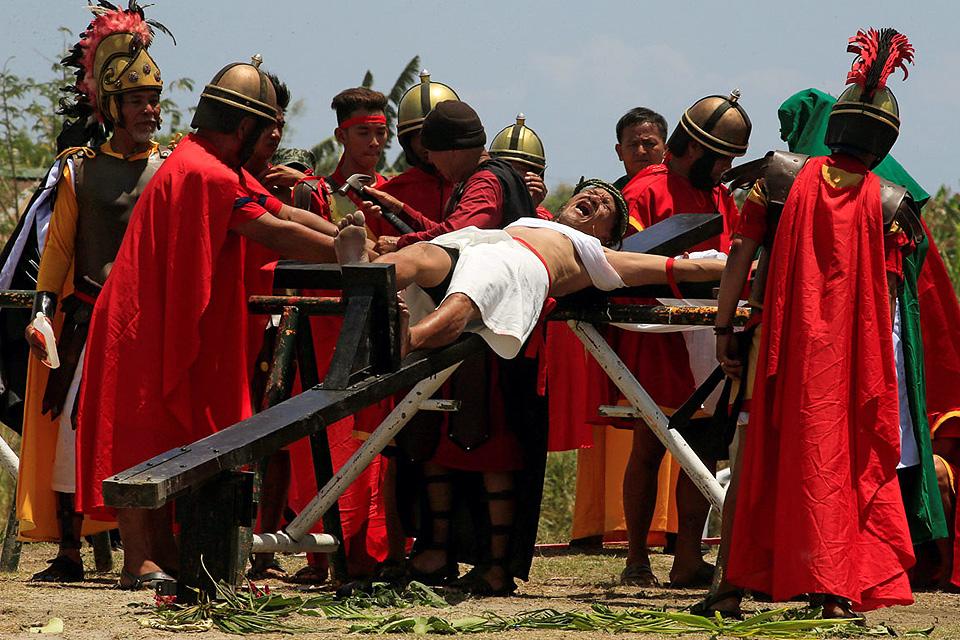Here are some of ‘panata’ Filipino Catholic faithful do every Holy Week

Holy Week is one of the most important times for Roman Catholics. It begins with Palm Sunday and culminates in Easter Sunday, celebrating Jesus' resurrection. This year, the observance of Holy Week begins on March 24 and ends on March 31.
In the Philippines, the Catholic faithful commemorate this sacred week not only by praying and reflecting but also by doing a panata.
A paper written by Anril Tiatco of the University of the Philippines Diliman defines panata as a religious vow whereby a devotee promises to make a sacrifice for his faith in the hope of being rewarded by the divine response to his prayers.
Here are some of the panata that Catholic faithful observe every Holy Week.
Flagellation
In some parts of the country, the practice of flagellation is being done to "imitate the Lord."
Self-flagellation is the act of punishing oneself by hitting their body with whips or sticks. This is also related to the practice of carrying a heavy cross while walking the streets and getting crucified with real nails, just as it was done to Jesus.
According to Sister Klara Neldis of Daughters of Virgin Mary Immaculate, there is a “belief that this practice can clean them from sins, granting prayers and cure illness.”
"However, the Catholic church disapproves of this practice,” she added.
The Department of Health has also discouraged this practice as it can lead to infection of wounds, it said back in 2022.
Crucifixion
Held every Good Friday, Crucifixion is when devotees or penitents called magdarame in Kapampangan willingly have themselves crucified to reenact Jesus Christ's suffering and death.
Penitents regard these acts to constitute mortification of the flesh, and they perform them to seek forgiveness for sins, to fulfill a panata, or to show gratitude for the blessings that have been given.
Visita Iglesia
Also known as Way of the Cross, or Stations of the Cross, Visita Iglesia is a practice that commemorates Jesus Christ's journey to his crucifixion. It involves going to 14 churches to pray and reflect on 14 key moments of Jesus' suffering and death. These days, going to seven churches is acceptable.
Penance or Feasting
Penance and Fasting are done every Good Friday. Fasting often means restricting food intake and having only one full meal a day.
Meanwhile, penance is observed by abstaining from eating meat, such as beef, pork, or chicken. In place of meat, Catholics are encouraged to eat vegetables and fish. Eggs, milk, grains, and fruits are also recommended.
Aside from Good Friday, fasting and abstinence are also obligatory on Ash Wednesday and every Friday of Lent.
Alay Lakad
"Alay Lakad," commonly done on Maundy Thursday and Good Friday, involves devout individuals walking barefoot or sometimes on their knees as an act of penance or devotion.
Devotees usually walk from Metro Manila and nearby provinces like Antipolo City’s International Shrine of the Our Lady of Peace and Good Voyage also known as the Antipolo Cathedral in Rizal.
Participants often undertake this journey to express their faith, seek forgiveness, or fulfill a vow made to God. It is a solemn and reflective practice that symbolizes humility and sacrifice, mirroring the suffering of Jesus Christ on his journey to the crucifixion.
Moriones Festival
The Moriones Festival is a week-long festival in the province of Marinduque that starts on Palm Sunday and ends on Eastern Sunday.
It features colorful parades and reenactments of the story of Longinus, the half-blind Roman centurion who pierced Jesus Christ's side during the crucifixion.
Participants, known as Moriones, wear Roman soldier costumes and masks which is known as “morion.”
While “panata” is a good way to express our devotion to Jesus Christ, Dominican brother Joenner Enriquez reminded Catholic devouts that panata should be done along with a prayer, and a change in the way of their living.
“Mahalagang tandaan na ang debosyon o pamamanata ay isang gawi ng pananalangin. Kung ang debosyon ay walang kasamang pananalangin, o di kaya nama'y hindi nababago ang tao sa sa hindi kaaya-ayang paguugali, ito'y masasabi nating patay na debosyon,” he explained.
— LA, GMA Integrated News




